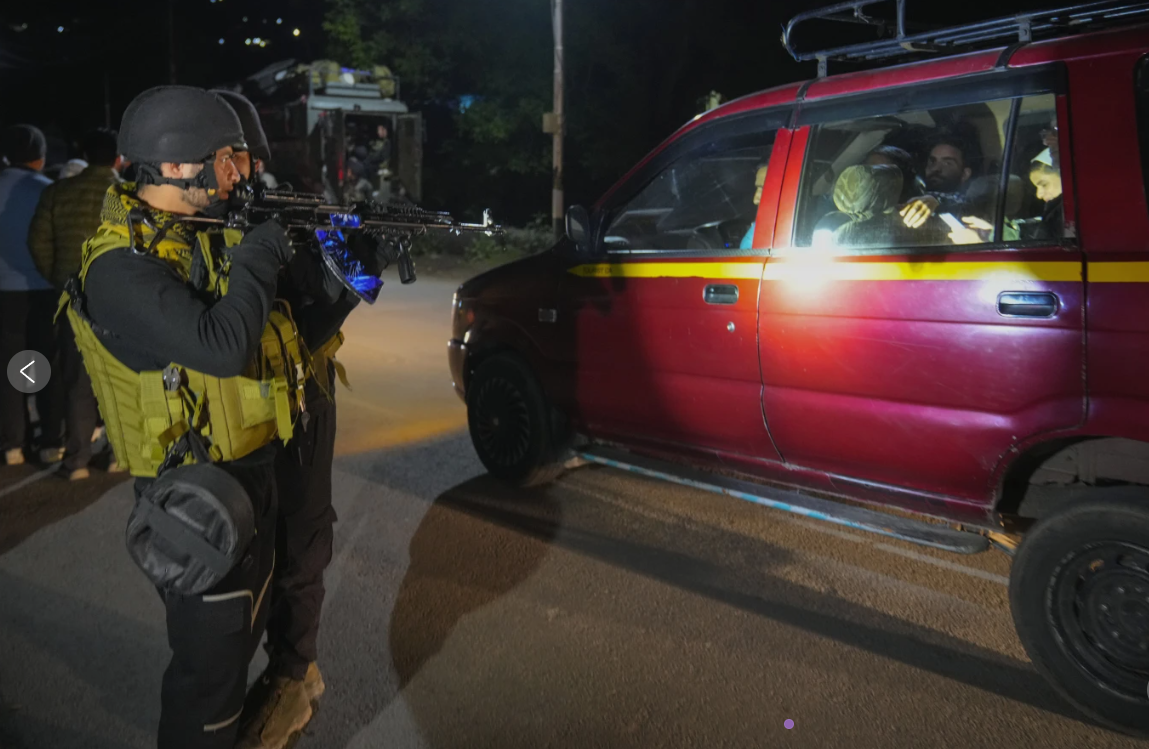#1 Happy Family USA is about a Muslim-American family desperately trying to convince their neighbours that they’re ordinary citizens.Prime/Supplied
You could probably count the Muslim characters who have appeared on popular American animated shows on one hand. There’s Baahir on South Park, the new kid in school whom Cartman accuses of being a terrorist. And then Bashir on The Simpsons, the new kid in school whose parents Homer accuses of being terrorists. And there’s Mahmoud on Family Guy, who actually turns out to be a terrorist.
That pretty much sums up the breadth of the Muslim experience in the cartoon landscape – a huge swath of the U.S. population defined by their proximity to jihad. It also leaves a huge burden of representation on #1 Happy Family USA, a new animated sitcom on Prime Video about a Muslim-American family desperately trying to convince their neighbours that they are absolutely, in no uncertain terms, not terrorists.
The show itself attempts to resist that burden, leading every episode with disclaimers that warn audiences not to use its alternately witty and juvenile gags – which are rated H for haram – as cultural representations of Muslims and Arabs. And yet the burden is still felt in its struggle to wring both humour and emotion out of its premise, where a young Muslim teen’s coming-of-age is coloured by Islamophobia in the days immediately following 9/11.
The series comes from Ramy Youssef, seemingly the only person in America who can get a show about funny Muslim families off the ground. He broke out five years ago with Ramy, the semi-autobiographical series about his experiences as an Egyptian-American, and followed that up with Mo, the Peabody-winning series he co-created with Palestinian comedian Mo Amer, based on the latter’s stateless life in America. With #1 Happy Family USA, Youssef, co-writing with South Park producer Pam Brady, draws once again from his own experiences as a teen growing up in New Jersey, voicing both the whiny young Rumi and his boisterous father, Hussein.
In the first episode, Rumi plots to seduce his teacher Mrs. Malcolm (Mandy Moore) with a mixtape of illegally downloaded hits. Meanwhile, Hussein, a former surgeon, dreams of turning his halal cart, parked just outside Fox News headquarters, into a franchise – the precision he once brought to the operating table now put to good use on the thinly sliced chicken he serves in his shawarmas. Rounding out the family are Rumi’s mom, Sharia (voiced by Canadian stand-up Salma Hindy), who is reconnecting with Islam by wearing a hijab out of guilt over her belligerent father’s death; her strong-willed mom (Randa Jarrar), whose refusal to acclimatize to America beyond rabidly devouring The Price Is Right makes up some of the show’s best gags; and daughter Mona (Alia Shawkat), who is trying to work up the nerve to come out to her family as a lesbian. Mona even agrees on a coming-out date with her girlfriend: Sept. 11, 2001.
Everyone’s plans are immediately complicated by the 9/11 attacks, and much of the humour and pathos in the series revolves around how Hussein overcompensates in response. “We, from today, have no culture,” he declares, before rallying his clan to become the “#1 Happy Family USA” of the title. That involves shaving his beard (which has a habit of immediately sprouting back), decorating his house and halal cart in obscene Americana, encouraging everyone to code-switch and even insisting that grandma “be liberated” by ditching her burka.
The animation is done by award-winning journalist and illustrator Mona Chalabi.Prime/Supplied
A lot of the plot lines and gags can feel overly familiar and even belaboured, especially since it’s stretching out material dealing with 9/11 and Islamophobia that comics Aziz Ansari, Kumail Nanjiani, Hasan Minhaj and even Youssef himself have mined throughout their careers. That leaves Mona Chalabi’s animations doing a lot of the heavy lifting. The Pulitzer Prize-winning journalist and illustrator (and executive producer on #1 Happy Family USA) is renowned for distilling worrisome data and the most despairing headlines into satirical and resonant drawings. And in this series, she finds fresh humour in the details – her busy animations worthy of freeze-framing just to savour every gag hidden in plain sight.
So much of the show’s best humour is in the jokes that have the most distance from 9/11, making the series an example of how rich cross-cultural comedy can be when Muslim-American stories are unburdened from terrorist narratives. But if the 9/11 stuff naturally makes the series less comical, the pervasiveness of that tragedy over every aspect of Muslim life – right down to Rumi’s anxieties around his sexual awakening – makes #1 Happy Family USA more emotional and meaningful than most cartoons before it.
When he hosted SNL last spring, Youssef recited a prayer during his opening monologue asking God to free the Palestinians and all the hostages. In #1 Happy Family USA, to advertise his shawarma, Hussein becomes a regular Fox News correspondent called “Halal Harry” in segments that describe him as “one of the good ones.” The show bridges the gap between 9/11 and today by contextualizing how difficult it can be to speak up for fellow Muslims who are being persecuted or massacred when the U.S. would rather reward those who stay silent or, even better, condemn their own.
#1 Happy Family USA often has us choking with laughter because of its overwhelming sense of guilt. Almost every member of the family, trained after 9/11 to perform some version of “model citizen,” is faced with compromising their humanity and empathy, all so they can work toward the American dream. It’s the inescapable tragedy for characters who are just trying to be more than what their predecessors on South Park, The Simpsons and Family Guy could represent.














